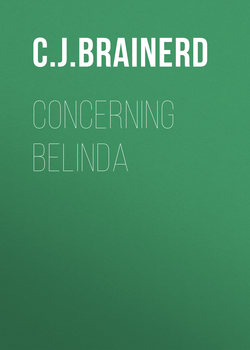Читать книгу Concerning Belinda - C.J. Brainerd - Страница 4
CHAPTER III
THE ELOPEMENT OF EVANGELINE MARIE
ОглавлениеEVA MAE rose, like a harvest moon, above the Ryder school horizon late in November. Large bodies being proverbially slow of motion, she had occupied the first two months of the school year in acquiring enough momentum to carry her from Laurelton, Mississippi, to New York and install her in the Misses Ryder's most desirable room – providentially left vacant by a defection in the school ranks.
The price of the room was high, but money meant nothing to Eva May. Creature comfort meant much. The new pupil clamoured for a private bath, but finally resigned herself to the least Spartan variety of school simplicity, bought a large supply of novels, made an arrangement by which, for a consideration, the second-floor maid agreed to smuggle fresh chocolates into the house three times a week, unpacked six wrappers, and settled down to the arduous process of being "finished" by a winter in New York.
Miss Lucilla Ryder, conscientious to a fault in educational matters, made an effort to plant Eva May's feet upon the higher paths of learning, and enrolled the girl in various classes; but the passive resistance of one hundred and ninety pounds of inert flesh and a flabby mind were too much for the worthy principal.
"We must do what we can with her," Miss Lucilla said helplessly to the Youngest Teacher. "She may acquire something by association; and, at least, she seems harmless."
Belinda agreed with due solemnity.
"Yes, unless she falls upon someone, she'll do no active damage."
"But her laziness and lack of ambition set such bad standards for the other girls," sighed Miss Lucilla.
Belinda shook her head in protest.
"Not at all. She's valuable as an awful example."
So Eva May, whose baptismal name was Evangeline Marie, and whose father, John Jenkins, a worthy brewer, had wandered from Ohio to the South, married a French creole, and accidentally made a colossal fortune out of a patent spigot, rocked her ponderous way through school routine, wept over the trials of book heroines, munched sweets, filled the greater part of the front bench in certain classes where she never, by any chance, recited, furnished considerable amusement to her schoolmates, and grew steadily fatter.
"If she stays until June we'll never be able to get her out through the door," prophesied Miss Barnes, the teacher of mathematics one morning, as she and Belinda stood at the door of the music-room during Eva May's practice hour, and looked at the avalanche of avoirdupois overflowing a small piano-stool. "Something really must be done."
Chance provided something. The ram in the thicket took the form of an epidemic started by Amelia Bowers, whose fond parents conceived the idea that their child was not having exercise enough in city confines and wrote that they wanted her to have a horse and ride in the Park. Being a southern girl she was used to riding, but they thought it would be well for her to have a few lessons at a good riding-school, and, of course, a riding-master or reliable groom must accompany her in the Park.
The Misses Ryder groaned. A teacher must chaperon the fair Amelia to riding-school, and sit there doing absent chaperoning until her charge should be restored to her by the riding-master. The teachers were already too busy. Still, as Mr. Bowers was an influential patron, the arrangement must be made.
No sooner was the matter noised abroad than the whole school was bitten by the riding mania. Those who could ride wanted to ride. Those who couldn't wanted to learn. Frantic appeals went forth by letters to parents throughout the United States, but riding in New York is an expensive pastime, and only five fathers responded with the desired blessings and adequate checks.
Miss Ryder wrote to the head of a popular riding-school and asked that someone be sent to talk the arrangements over with her.
The next evening, during recreation hour, the girls fortunate enough to be in the drawing-room saw a radiant vision ushered in by the maid and left to await the coming of the principal.
He was slim, he was dapper, he was exquisite, he was French. His small black moustache curved briskly upward from red lips curved like a bow; his nose was faultlessly straight; his black eyes were sparkling; his brows were well marked, his dark hair was brushed to a high, patent-leather polish.
He wore riding clothes of the most elaborate type, despite the hour of his visit, and as he sat nonchalantly upon the red-damask sofa he tapped his shining boots with a knowing crop, curled his moustache airily, and allowed his glance to rove boldly over the display of youthful femininity. A number of the older girls rose and left the room, but a majority lingered fearfully, rapt in admiration and wonder.
Eva May palpitated upon a commodious window-seat. Here was a realization of her brightest dreams. So Comte Robert Montpelier Ravillon de Brissac must have looked as he sprang lightly from his curveting steed and met the Lady Angélique in the Park of Flambéron. In her agitation she tucked a caramel in each cheek and forgot that they were there.
"Young ladies, you may be excused."
Miss Emmeline Ryder had arrived.
The girls departed, and a buzz of excited conversation floated back from the hall; but Evangeline Marie went silently to her room, sore smitten.
If Miss Lucilla Ryder had been selected by the Fates to meet Monsieur Albert de Puys, the chances are that some riding-school other than Manlay's would have been patronized by the Ryder school, for Miss Lucilla was a shrewd judge of men and things; but, as luck would have it, Miss Lucilla was suffering from neuralgia, and Miss Emmeline, gentle, vague, confiding, was sent down to conduct the interview.
